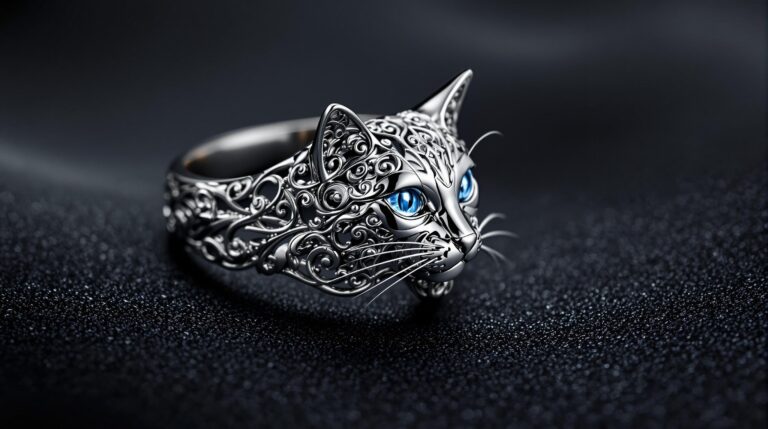Cats Ear Mites can be a frustrating and uncomfortable issue for both pets and their owners. At Cat Karma Creations, we understand the importance of keeping your feline friend healthy and happy. This article will guide you through the common symptoms, effective treatments, and preventive measures to ensure your cat stays in top condition. By the end, you’ll have a comprehensive understanding of how to identify and treat ear mites in cats, as well as tips for maintaining ear health.
Common Symptoms of Cats Ear Mites
Head Shaking and Ear Scratching
One of the most common signs of ear mites in cats is frequent head shaking and ear scratching. If you notice your cat engaging in these behaviors more than usual, it could be an indication of ear mites. Cats with ear mites often scratch their ears vigorously, which can lead to irritation and even bleeding. If you’re concerned, feel free to reach out to us at (800) 343-1604 or visit our contact form for more information.
Cats Ear Mites Dark Debris in the Ear Canal
Another telltale sign of ear mites is the presence of dark, crumbly debris in the ear canal. This debris, which can resemble coffee grounds, is a mixture of ear wax, blood, and dead skin cells. If you see this type of debris, it’s a strong indicator that your cat may have ear mites.
Foul Odor from the Ears
Ear mites can also cause a foul odor to emanate from your cat’s ears. This odor is often described as musty or yeasty and can be quite noticeable. If you notice an unpleasant smell coming from your cat’s ears, it’s a good idea to have them checked for ear mites.
Redness and Inflammation
Ear mites can cause inflammation and redness in the ear canal. This inflammation can be painful for your cat and may lead to further complications if left untreated. If you notice redness or swelling in your cat’s ears, it’s important to seek veterinary care.
How to Treat Ear Mites in Cats
Over-the-Counter Treatments
There are several over-the-counter treatments available for ear mites in cats. These treatments typically come in the form of ear drops or solutions that are applied directly to the ear canal. While over-the-counter treatments can be effective, it’s important to follow the instructions carefully and consult with your veterinarian if you have any concerns. Our team at Cat Karma Creations is always here to help, so don’t hesitate to contact us at (800) 343-1604 or via email at info@catkarmacreations.com.
Prescription Medications
For more severe cases of ear mites, your veterinarian may prescribe prescription medications. These medications are often more potent and can provide faster relief for your cat. Prescription treatments may include ear drops, oral medications, or injections. Your veterinarian will determine the best course of action based on the severity of your cat’s condition.
Natural Remedies
Some pet owners prefer to use natural remedies to treat ear mites in cats. Common natural treatments include apple cider vinegar, coconut oil, and herbal solutions. These remedies can help to soothe the ear canal and reduce inflammation. However, it’s important to use natural remedies in conjunction with veterinary advice to ensure they are safe and effective for your cat.
Step-by-Step Treatment Guide
Here is a step-by-step guide to treating ear mites in cats:
- Clean your cat’s ears using a gentle ear cleaner recommended by your veterinarian.
- Apply the prescribed treatment, whether it’s an over-the-counter ear drop, prescription medication, or natural remedy.
- Follow the treatment schedule recommended by your veterinarian, which may involve multiple applications over several days or weeks.
- Monitor your cat’s ears for improvement and any signs of adverse reactions.
- Follow up with your veterinarian to ensure the treatment is effective and complete.
Preventing Ear Mites in Cats
Regular Ear Cleaning
Regular ear cleaning is one of the best ways to prevent ear mites in cats. Use a gentle ear cleaner and a soft cloth or cotton ball to clean your cat’s ears. Be sure to follow the instructions on the cleaner and avoid using cotton swabs, which can push debris deeper into the ear canal. For more tips on cat care, visit our All Jewelry page for stylish and functional accessories.
Ear Check-Ups
Schedule regular ear check-ups with your veterinarian to ensure your cat’s ears are healthy. During these check-ups, your veterinarian can identify any signs of ear mites or other ear issues and provide appropriate treatment. Our Cat Themed Jewelry can make these visits more enjoyable for both you and your cat.
Maintaining a Clean Environment
Keeping your cat’s environment clean can help prevent ear mites. Regularly wash your cat’s bedding and vacuum areas where your cat spends time. This can help remove any mites or eggs that may be present in the environment. For more ideas on creating a cat-friendly home, explore our Nature Inspired collection.
Popular Quote
“The greatest wealth is health.” — Virgil
While this quote emphasizes the importance of overall health, it also underscores the need to pay attention to your cat’s well-being, including their ear health.
Statistical Fact
According to the American Veterinary Medical Association (AVMA), ear mites are one of the most common ear problems in cats, affecting up to 5% of the feline population. While this statistic is based on data from various veterinary clinics, it highlights the prevalence of ear mites and the importance of regular ear check-ups and treatments.
Three Tips for Preventing and Treating Ear Mites in Cats
1. Regular Ear Inspections
Regularly inspect your cat’s ears for any signs of ear mites, such as dark debris, redness, or a foul odor. Early detection can prevent the condition from worsening and make treatment more effective.
2. Use Gentle Ear Cleaners
Choose a gentle ear cleaner recommended by your veterinarian to clean your cat’s ears. Avoid using cotton swabs, which can push debris deeper into the ear canal and cause further irritation.
3. Follow a Treatment Schedule
Whether you opt for over-the-counter treatments, prescription medications, or natural remedies, follow the treatment schedule recommended by your veterinarian. Consistency is key to ensuring the treatment is effective and complete.
Popular Questions About Ear Mites in Cats
Are Ear Mites Contagious to Other Pets?
Yes, ear mites are highly contagious and can easily spread between pets. If you have multiple cats or other pets, it’s important to treat all of them for ear mites to prevent reinfestation. Keep infected pets isolated from other pets until they have completed their treatment. For more information, feel free to contact us at (800) 343-1604 or via email at info@catkarmacreations.com.
Can Ear Mites Affect Humans?
While it is rare, ear mites can affect humans. However, they are more commonly found in animals. If you suspect you have ear mites, consult a healthcare professional for proper diagnosis and treatment.
How Long Does Treatment Take?
The duration of ear mite treatment can vary depending on the severity of the infestation and the type of treatment used. Over-the-counter treatments may require multiple applications over several weeks, while prescription medications may provide faster results. Always follow the treatment schedule recommended by your veterinarian.
What Are the Side Effects of Treatment?
Most ear mite treatments have minimal side effects. However, some cats may experience irritation or redness in the ear canal. If you notice any adverse reactions, stop the treatment and consult your veterinarian. They can recommend an alternative treatment or adjust the dosage.
Can Ear Mites Be Prevented?
Yes, ear mites can be prevented through regular ear cleaning and check-ups. Keeping your cat’s environment clean and treating all pets in the household can also help prevent reinfestation. If you have outdoor cats, consider using preventive treatments recommended by your veterinarian.
What Should I Do if Symptoms Persist?
If your cat’s symptoms persist despite treatment, it’s important to consult your veterinarian. Persistent symptoms may indicate a more serious underlying condition, such as an ear infection or a different type of parasite. Your veterinarian can perform a thorough examination and provide appropriate treatment.
Comparison of Ear Mite Treatments for Cats
Choosing the right treatment for ear mites in cats can be challenging. Here is a comparison of over-the-counter treatments, prescription medications, and natural remedies:
| Feature | Over-the-Counter Treatments | Prescription Medications | Natural Remedies |
|---|---|---|---|
| Effectiveness | Moderate | High | Low to Moderate |
| Cost | Low to Moderate | High | Low |
| Side Effects | Minimal | Possible | Minimal |
| Ease of Use | Easy | Moderate | Easy |
| Availability | Widely Available | Requires Prescription | Widely Available |
Final Thoughts About Cats’ Ear Mites
Ear mites in cats can be a challenging issue, but with the right knowledge and treatment, you can ensure your feline friend remains healthy and comfortable. Regular ear check-ups and cleanings are essential for prevention, and a combination of over-the-counter treatments, prescription medications, and natural remedies can effectively manage and treat ear mites. If you have any concerns or questions, don’t hesitate to contact your veterinarian for professional advice. For more resources and support, visit our website at Cat Karma Creations or follow us on social media: Facebook, Instagram, Pinterest, and Twitter.















